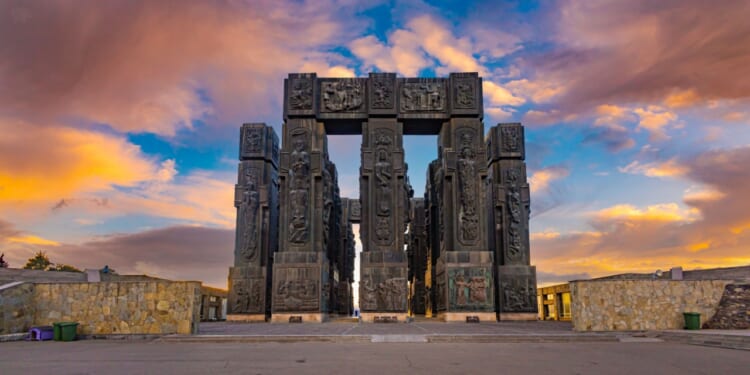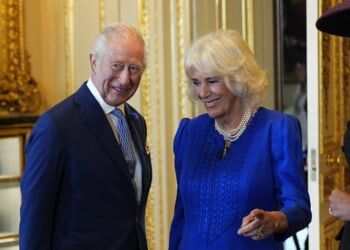Georgia has slowly come under Russian and Chinese influence, without much of a US response.
The recent US-brokered peace deal between Azerbaijan and Armenia demonstrates a rare diplomatic breakthrough for Washington. But America’s window in the Caucasus is closing. Unless Washington acts, it could lose Georgia, a strategically vital state in the South Caucasus, to Moscow, without a single shot being fired.
By ensuring stability in one of the South Caucasus’s most fragile relationships, the peace deal gives the United States a window to contain Russian adventurism, as well as Chinese and Iranian influence. However, even though peace has been established between Baku and Yerevan, long-time adversaries, a strategic vacuum remains, one that authoritarian powers are eager to fill due to the declining engagement of the West. It is Georgia, not Azerbaijan or Armenia, that is the real test of US power in the South Caucasus.
Once regarded as a bulwark of democracy in the South Caucasus and a partner of the West’s regional strategy, Georgia, under the anti-Western Georgian Dream (GD) government, has repeatedly undermined Western and American interests. Tbilisi has aligned instead with Russia’s and China’s goal of diminishing US influence and eroding its foothold in the Black Sea and South Caucasus.
However, Georgia is more than a frontline state: it is the South Caucasus transit hub. The Baku-Tbilisi-Ceyhan (BTC) oil pipeline, the South Caucasus gas pipeline, and the crucial Middle Corridor trade route, which connects Europe to Central Asia through the Black Sea, all run through Georgia.
These projects are of strategic importance to the West, as they enable Central Asia and the West to bypass Russia and Iran, reduce Europe’s dependence on Russian energy, and integrate Georgia into a web of Western-backed infrastructure. This makes Tbilisi indispensable in the framework of Western energy security and Washington’s wider Eurasia strategy. Therefore, Georgia’s pivot away from the West will fundamentally undermine Western access to key economic and transit corridors, as these routes will be politically leveraged against Western allies by revisionist actors.
With China advancing its Belt and Road, and Russia pushing north-south routes with Iran, Georgia’s role as the hinge of the Middle Corridor is one of the few ways the United States can anchor itself economically in Eurasia without entering into further military commitments. Losing this platform would mean ceding both trade and influence to authoritarian powers.
If Washington is unable to translate the recent peace deal between Azerbaijan and Armenia into a strategy that prioritizes a broader regional framework, which also addresses Georgia’s anti-Western trajectory and democratic backsliding, then the strategic balance will tilt toward authoritarian powers. That means that the peace deal will be short-lived, as the South Caucasus will once again become a foothold of authoritarian, revisionist powers.
Moscow and Beijing understand this. Russia has undermined Georgian democracy not with tanks, but by trade deals, media control, and political proxies—installing a regime sympathetic with Moscow. Beijing has gone further, utilizing the regime in Georgia to establish strategic partnerships and gain geo-strategic and geo-economic footholds in the South Caucasus through roads, ports, and infrastructure.
The main actor that has been drifting Georgia away from its transatlantic trajectory is the ruling Georgian Dream party, led by Bidzina Ivanishvili, a billionaire with ties to Russia’s political and business elite. GD has adopted a two-track strategy of acting like an ally to the West and its values at home, while quietly restoring ties with the Kremlin behind the scenes.
For the last 13 years, Tbilisi has increased trade with Russia, helped it evade sanctions, assisted China in acquiring projects of geopolitical importance, facilitated Russian commerce to dominate key sectors, made allies with the regime in Iran, and stalled integration with NATO and the EU, while also copying the authoritarian playbook of Russia and its allies at home. Therefore, Moscow isn’t invading Georgia—it’s buying it, one proxy and pipeline at a time.
And Moscow isn’t the only predator circling. As Georgia’s ties with the West weaken, it creates an opportunity for even more active engagement with China and Iran, who are expanding their influence in the region.
Through investments in infrastructure, China has become so deeply integrated into the Georgian economy that certain projects cannot be completed without Chinese involvement, raising concerns about over-dependency on China. While Beijing has its geopolitical interests in the region, Iran views Georgia as a potential loophole to circumvent Western sanctions and enhance regional trade. Beijing builds ports, Tehran moves commerce, and both exploit Georgia’s drift to turn it into a sanctions loophole and a Belt and Road outpost.
As a result, a new axis of authoritarian connectivity has emerged in the South Caucasus, the kind of order that aims to drive the West out of a region that’s of strategic importance to its interests. Without Georgia, Western access to Central Asia will diminish, which will consequently result in weakened European energy security and the exposure of NATO’s south-eastern flank. It also sends a dark message to every partner in a fragile security environment on Russia’s periphery that hybrid aggression is effective, and America lacks the capacity to prevent it.
What Washington needs to do isn’t to entirely re-evaluate its strategy in the South Caucasus, but to act quickly to protect its existing leverage. The ultimate goal isn’t to fundamentally change the politics in Georgia, but to safeguard remaining American influence at a critical crossroads of Eurasia. Washington needs to do four things: draw red lines, punish spoilers, hedge with Azerbaijan, Turkey, and Armenia, and prioritize leverage over ideals.
One essential tool already in Washington’s hands is the MEGOBARI Act, dedicated to countering the influence of the Chinese Communist Party, the Iranian Regime, and the Russian Federation in the nation of Georgia.
It authorizes the imposition of sanctions against Georgian officials who erode democratic institutions and assist Russian, Chinese, and Iranian malign influence. It directs different governmental agencies in the United States to reevaluate security and aid cooperation. This is a real, tangible instrument that Washington can utilize to reestablish its leverage. It signals that alignment with US adversaries is not cost-free, as it will come at the expense of access to American markets, diplomatic support, and military training.
The events unfolding in Georgia are not only a local political crisis but also a test case for hybrid operations by authoritarian regimes. If the United States does not use its leverage to counter revisionist forces from establishing a foothold in the South Caucasus, it will lose a critical part of its deterrence framework and Eurasian connectivity strategy.
Washington doesn’t need to rescue Georgia. However, it must make clear that a future within Moscow’s sphere carries costs—and that a partnership with the West still offers real strategic value for those who pursue it. The United States just won a peace deal in the Caucasus. But if it loses Georgia, it loses the region and hands Moscow, Beijing, and Tehran the victory they could never win on the battlefield.
About the Author: Nicholas Chkhaidze
Nicholas Chkhaidze is a Research Fellow at the Topchubashov Center, a think-tank based in Baku. His research focuses on Russia, Ukraine, the South Caucasus, and Russian Private Military Companies. He obtained his Bachelor’s degree in International Relations with honors from the International Black Sea University.
Image: Kadagan / Shutterstock.com.

















